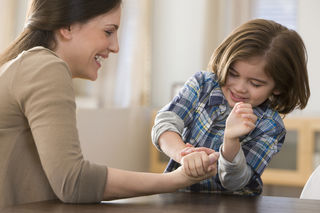Parenting
One Parent Can Do Just As Good a Job As Two, Women Say
Survey finds openness to single life, single parenting, diverse family forms.
Posted August 9, 2017

The 21st century has been a time of growing diversity in family forms and ways of living. Single parenting, no parenting, living single, living alone, living with friends, and many other non-traditional living arrangements are all on the rise. How do American women view these innovative ways of living? New findings from a national survey suggest that single and married women, with and without children, are mostly open-minded about the many ways people live now.
The nationally representative online survey was conducted by the nonprofit organization Family Story, together with Lake Research Partners. The participants were 1,058 women. Results were summarized across all participants, and also reported separately for three groups: single mothers; single women with no children; and married women, with or without children.
Single Parents and Other Important Adults in Children’s Lives
Perhaps the most remarkable finding was that more than 70 percent of participants believed that a single parent can do just as good a job as two parents. (By subgroup, 70 percent of the married women and single women with no children believed that, along with 78 percent of the single mothers.) Research suggests they may be right.
Just seven years ago, a Pew Research Center survey of a nationally representative sample of American men and women offered a much less positive assessment. Answering a different but related question, a substantial majority — 69 percent — said that it was bad for society that more single women were having children. In that same survey, only a minority believed that it was bad for society that more people were living together without marrying, that more unmarried couples were raising children, that more gay couples were raising children, and that more people of different races were marrying.
The women in the Family Story survey seemed to realize that single parents are often not raising their children single-handedly. In fact, although they think one adult can do just as good a job as two at raising children, they also think children do best when several adults are invested in them. What made that finding noteworthy was that the women don’t think those adults need to be married parents or even romantic partners.
Just over half of the women agreed that “there should be more ways to raise children with someone who is not a romantic partner.” Most of the single mothers (58 percent) said that they would consider raising a child with someone who is not a spouse or romantic partner. Many already receive substantial support from others in raising their children, including, for 45 percent of them, financial support.
Family members such as grandparents have long had important roles in the lives of children, particularly in multi-generational households. That continues today. Other relatives, such as aunts, uncles, cousins, siblings, and close family friends who are treated as kin, are often involved in significant ways, too. What is new to the contemporary scene are radical innovations such as parenting partnerships, in which adults look specifically for other adults to be co-parents, but not romantic partners.
Single Mothers Are Still Judged, But Less Harshly
Another encouraging finding from the Family Story survey was that there were more single mothers who did not feel judged for being a single mother (49 percent) than who did feel judged (45 percent). Still, the women in the survey (and not just the single mothers) believed that single mothers are judged most harshly and married mothers least harshly, with single fathers in between. (They were not asked about married fathers.)
Single mothers and married mothers were judged for different things. Single mothers said they were most often judged for not having enough money, not picking a better father for their children, for the choices that led them to become single mothers, and for not being married to the father or in a relationship with him. Married mothers were infrequently judged for not picking a better father for their children or for the choices they made in their lives. If they were judged, it was usually for the decisions they made for their children or for parenting mistakes. (Other research shows that single fathers are judged, too — but that they often defy those caricatures.)
Interested in Marriage?
Asked whether they would like to be married, 51 percent of the single mothers said they would, along with 39 percent of the single women. The others said either that they simply did not want to be married (10 percent of the single mothers and 18 percent of the single women without kids); that they didn’t think they wanted to be married, but were open to their feelings changing (18 percent for both groups); or that they felt no need to be legally married, but they have or would like to have a committed romantic partner (17 percent of the single mothers, 16 percent of the single women with no children).
Compared to other surveys in which a substantial percentage of participants said that they didn’t know if they wanted to be married, “don’t know” was an uncommon response in the Family Story survey. Maybe that’s because the participants had more options to choose from than just “yes, I want to be married,” or “no, I don’t.”
Women’s Liberation
Reflecting on the survey results, Nicole Rodgers, Family Story founder and co-director, said: “Our survey shows that women are pretty open-minded about building lives, and raising families, in all sorts of ways. The family is always evolving, and what we are seeing in this survey, in part, reflects women’s liberation from one narrow path. That’s a good thing.”




